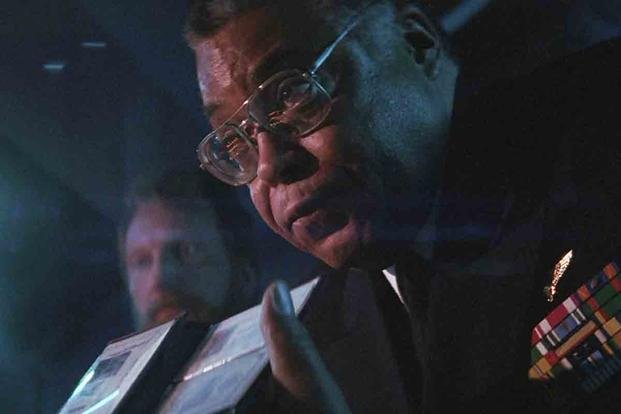Despite achieving great fame, James Earl Jones often spoke fondly of his time in the U.S. Army, particularly his involvement with the Pershing Rifles. That era of his life helped him achieve the discipline, confidence and sense of purpose that would shape his journey from a young ROTC cadet to one of the most respected figures in theater and film.
Early Life of James Earl Jones
James Earl Jones was born on January 17, 1931, in Arkabutla, Mississippi, a small town near Memphis. When he was a young boy, he was sent to Michigan to be raised by his maternal grandparents on a farm near Jackson, about 45 minutes west of Ann Arbor.
A gifted student and athlete, he initially pursued a path toward medicine, enrolling at the University of Michigan as a pre-med student. He ended up finding a deeper calling within the Reserve Officers' Training Corps (ROTC), which funded his education.
His talents soon led him to the university's School of Music, Theatre & Dance, marking the beginning of a lifelong connection to performance. Still, military discipline and camaraderie played a central role in his early development.
James Earl Jones Military Service
The world of medicine lost a potential great in the summer of 1953, but the U.S. Army and the world of film and television benefited from its loss. That was the year Jones graduated from UMichigan and, instead of going to medical school, was commissioned a second lieutenant.
Jones would have entered the Army that summer either way. He attended Michigan as a pre-med student, funded by the university's Reserve Officers' Training Corps. While in college, he became disillusioned with the idea of becoming a doctor but realized that he thrived in military culture.
By all accounts, Jones was an exceptional cadet. He joined the Pershing Rifles Drill Team and the National Society of Scabbard and Blade. The same performance ability that let him excel with the Pershing Rifles led him to the Michigan's School of Music, Theatre & Dance. He knew he wanted to be an actor, but he once referred to his fellow cadets as "the only semblance of a social life."
He initially left the university without completing his degree. With the Korean War raging, he thought he would be sent overseas. But the conflict ended in an armistice later that year and – although he returned to graduate in 1955 – Jones' life took a different course.
After graduating from college, he was sent to Fort Benning, Georgia, for the Officers Basic Course and to attend Ranger School. Assigned to the 38th Regimental Combat Team, he led the setup of a cold-weather training command at Camp Hale near Leadville, Colorado.
"Our regiment was established as a training unit, to train in the bitter cold weather and the rugged terrain of the Rocky Mountains," Jones told the Army in an interview. "I took to the physical challenge, so much so that I wanted to stay there, testing myself in that awesome environment, mastering the skills of survival.
"I loved the austere beauty of the mountains and the exhilaration of the weather and the altitude. I didn't mind the rigors of the work or the pioneer-like existence. I thought it was a good life."
Military Service Snapshot:
- Years of service: 1953–1955
- Branch of service: United States Army
- Rank: First lieutenant
- MOS: Infantry officer
- Assignments: Fort Benning, Georgia; Camp Hale, Colorado
- Conflict: Post-Korean War period
- Military Awards: Honorable discharge, ROTC recognition
Acting Career
Jones, a good officer, was soon promoted to first lieutenant. When the time came to decide whether the Army should be his career, a pivotal moment in his life occurred when his commanding officer asked him a poignant question: "Is there anything you feel like doing on the outside?"
Jones’ father, Robert Earl Jones, had been an actor performing in plays while James was a young man (and later taking on notable roles in film). Jones told his commanding officer he had often thought about following his father's path. His commander told him he could always come back to the Army, but he should pursue his dreams.
After his discharge, Jones moved to New York City, where he took a janitorial job to pay the bills while studying acting at the American Theatre Wing using his GI Bill benefits.
Acting Achievements
His first acting jobs came in Michigan at the Ramsdell Theatre in Manistee, where he had once worked as a carpenter and stagehand. Just two years later, he was a lead actor. By 1957, he was on Broadway. In 1964, he made his film debut as Lt. Lothar Zogg, a B-52 Stratofortress bombardier in Stanley Kubrick's "Dr. Strangelove or: How I Learned to Stop Worrying and Love the Bomb."
His first leading role was in the 1970 film "The Great White Hope," a part he'd previously played on stage. His performance led to his first Academy Award nomination for best actor, making him the second Black man to receive the nod.
The question “Who played Darth Vader?” is often asked, and there are several answers. More than one actor physically played the role of the iconic Star Wars character, but Jones provided the deep, imposing voice of the Jedi Knight who falls to the dark side of the Force.
Summary of Jones’ Acting Achievements
- Academy Award Nominee for The Great White Hope
- Tony Award Winner for The Great White Hope and Fences
- Voice of Darth Vader in the Star Wars saga
- Voice of Mufasa in Disney's The Lion King
- Emmy Awards for Heat Wave and Gabriel's Fire
- Grammy Award for Best Spoken Word Album
- Screen Actors Guild Life Achievement Award
- National Medal of the Arts
- Kennedy Center Honors
- Achieved the EGOT: Emmy, Grammy, Oscar, and Tony
James Earl Jones Passing and Legacy
With a career spanning more than 60 years, Jones has been called "one of the greatest actors in American history" and "the best known voice in show business." He received the National Medal of the Arts from President George H.W. Bush, Kennedy Center Honors from President George W. Bush, and the Screen Actors Guild Life Achievement Award.
Despite all that success, he still remembered his time in the Pershing Rifles as some of the best years of his life.
Jones died at his home in Dutchess County, New York, on September 9, 2024. He was 93 years old.
He leaves behind a profound legacy as both an actor and a veteran. His voice, widely regarded as the most iconic in show business, left an indelible mark on American culture, while his career, spanning over six decades, inspired generations of performers.
Find the Right Veteran Job
Whether you want to polish your resume, find veteran job fairs in your area or connect with employers looking to hire veterans, Military.com can help. Subscribe to Military.com to have job postings, guides and advice, and more delivered directly to your inbox.








